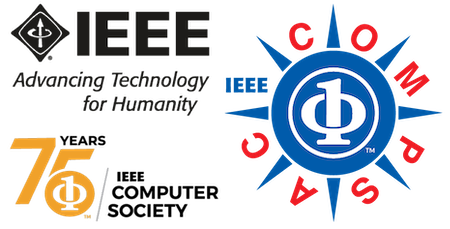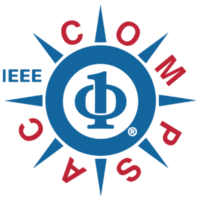1st Annual Student OER Contest
 This contest is officially endorsed by the IEEE Education Society.
This contest is officially endorsed by the IEEE Education Society.
 The IEEE Computer Society Computers, Software, and Applications Conference (COMPSAC), in honor of the Computer Society’s 75th anniversary, is announcing COMPSAC’s first Annual Student OER Contest and invites undergraduate college/university student submissions.
The IEEE Computer Society Computers, Software, and Applications Conference (COMPSAC), in honor of the Computer Society’s 75th anniversary, is announcing COMPSAC’s first Annual Student OER Contest and invites undergraduate college/university student submissions.
OERs (Open Educational Resources) are Web-accessible entities that can be used by teachers to teach, or students to learn. Submissions are open to undergraduate higher education students, working alone or in teams of up to 4, who have developed a Web-based OER that can be used for teaching or learning at the undergraduate college or university level of Computer Science or Information Technology.
The organizers of COMPSAC 2021 (Professors Edmundo Tovar, Henry Chan, and Claudio Demartini) are pleased to announce and congratulate the winners of the 1st Annual COMPSAC Student OER Contest. They are:
- First Prize: Learning Computing by Card Magic, by Caiqi Zhang, The Hong Kong Polytechnic University
- Second Prize: VerilogMaster, by Ritika Paliwal, Rushikesh Shendare, Biral Pradhan and Pratik Solav, National Institute of Technology Warangal, India
- Third Prize: Op-pymize.upn by Nathalia Montero Gómez and Andrés Santiago Jiménez Guzmán, Universidad Pedagógica Nacional de Colombia
The students’ description of their prize-winning OERs can be found below. Computer Science and Information Systems instructors are urged to examine these students’ work, each reviewed by a team of senior CS and IS faculty, to determine their utility in your courses. The OER metadata as well as direct links to the winning OERs can be retrieved from the MERLOT repository via the links shown below. Contest rules and prizes can be found at https://ieeecompsac.computer.org/2021/oer-contest/.
The contest organizers wish to thank all the students whose excellent submissions made it difficult for our international team of faculty reviewers to select the three prize winners shown below.
First Prize: Learning Computing by Card Magic – https://www.merlot.org/merlot/viewMaterial.htm?id=773405883 – Caiqi Zhang, The Hong Kong Polytechnic University
Learning Computing by Card Magic is an online video tutorial aiming at teaching computing related knowledge by playing card magic. The illustration style is original, and it is both suitable for computer science beginners and also teachers who want to make the class more interesting. In the video, it first shows a card magic to arouse the interest of the audience and then try to explain the magic using computer science concepts. At last, a program is provided to simulate the magic procedure.
The use of magic as a computer science OER is an innovative idea. The video is very practical. Students can use it to learn basic computing knowledge, and teachers can use it to enhance the interest of the class. For example, in this video, students can learn the conversion between decimal numbers and binary numbers, and also some useful data structures. At the same time, it can improve students’ programming. The video provides a concrete example and completing the programming exercises presented in the video can also consolidate students’ understanding of the concepts. We are also considering to make magic computing tutorial into a series, providing more examples and explaining more knowledge. All in all, Learning Computing by Card Magic is an innovative attempt in the computer science OER field.
Second Prize: VerilogMaster – https://www.merlot.org/merlot/viewMaterial.htm?id=773405888 – Ritika Paliwal, Rushikesh Shendare, Biral Pradhan and Pratik Solav, National Institute of Technology Warangal, India
The website ‘VerilogMaster’ is our contribution to the community of Verilog learners, which includes students and industry professionals from all over the world. Our work is entirely original and every article has been crafted by the members of the team.
Verilog is a Hardware Description Language (HDL) used to model and design electronic circuits and devices. It is unanimously used in many institutions worldwide and the number of online learning resources on Verilog is very less as compared to the resources available for software programming languages like Python and C. Scarcity of reliable online resources on Verilog is one of the main reasons, we thought of developing this website. We wish to make our OER as a teaching aid for professors and a learning aid for students worldwide. It also aims to provide help to industry professionals who use Verilog on a day-to-day basis.
Our team is a set of 4 highly enthusiastic undergraduate students from NITW, India who have learnt the Verilog language and are in the process of polishing their skills further. Every member contributed to the content development, Verilog coding, website development, graphic designing, layout of the website, management of the content and distribution into subtopics. With a goal to provide thorough understanding of design techniques and their implementation in Verilog, we have tutorials ranging from basic gates to advanced registers and memory elements. The content is unique, non-plagiarized and authentic. For the current deployment we have categorized the tutorials as: Basics of Verilog, Levels of Abstraction and Combinational Circuits.
For further sections, we plan to add: Sequential Circuits and Advanced Arithmetic Units. Presently, the website is entirely functional and we are in the process of adding new tutorials to our local repository.
Our aim is to make Verilog Master a one stop platform for all things Verilog! Our goal is to publish tutorials on numerous different logic blocks and arithmetic circuits which can be coded using Verilog. Once we achieve the milestone of a decent number of articles on Verilog, then we wish to include content on System Verilog (SV) as well. SV is another high-level language used for similar modeling but it provides increased functionality. COMPSAC OER Competition is exactly the required head start that our website needs in order to get increased and widespread reach. We hope we will be able to make a change through VerilogMaster!
Third Prize: – Op-pymize.upn – https://www.merlot.org/merlot/viewMaterial.htm?id=773405779 – Nathalia Montero Gómez and Andrés Santiago Jiménez Guzmán, Universidad Pedagógica Nacional de Colombia
Op-pymize.upn is a workshop-guide focused on solving problems in an optimal way, obtaining the best results through the Python programming language. It is aimed at students as a learning tool and as a support or complementary resource for the teacher who requires it. The OER was developed for secondary education, corresponding to the last two degrees to be a bachelor, and higher education, made up of university students (Colombian educational system). The proposal is part of the workshops offered in virtual meetings of the UPN.py Club, an academic club of the degree in electronics, however, it was modified and redesigned in an interactive and interesting way to be available to members or users on the page Club website. The team members are the representative and the secretary of the UPN.py Club, so the material is of their own and original authorship. During the process of creating the material, the two members took the role of developers, in which each one appropriated an exercise to explain and expose the problem, considering the styles, typeface, colors and different interactive elements.
The OER is divided into two sections, the introductory page and the problems, initially the content referring to the optimization topic and the code that will solve the exercises on the next page will be observed. The second part includes two types of exercise according to their application, these are shown in such a way that students will be completing fields as they go through the explanation and solution of the problem, which allows them to perform various cognitive processes in real time.
This topic was developed because the optimization of processes allows to reduce or eliminate the loss of time and resources, helping to avoid unnecessary expenses, obstacles and errors to reach the goal of the process, applying it to different areas of knowledge. Additionally, Op-pymize.upn includes the potential that programming has for solving this kind of problem, opening the field of optimization to a language that helps to understand what you want to find and how to achieve it, being the case of Python, which is a high-level, object-oriented programming language with integrated dynamic semantics, mainly for web development and computer applications, considering it as a multiparadigm language suitable for most platforms. Besides this product could be very useful in several subjects of the computational science curriculum since it contains different topics of linear algebra and optimization, but it also manages to break down others such as differential calculus and programming, allowing interaction and mutual learning, denoting the importance of find the relationships that exist between different areas of knowledge.
In conclusion, the proposed material considers three important aspects to achieve learning, and it is that it incorporates the acquisition of knowledge through instruction, reasoning and exercise in a single environment with their respective feedback of responses, in this way the student acquires or transforms their abilities, skills or attitudes regarding the subject, while recognizing errors, acquires concepts and practice around their logical and computational thinking.

